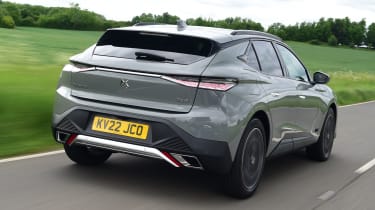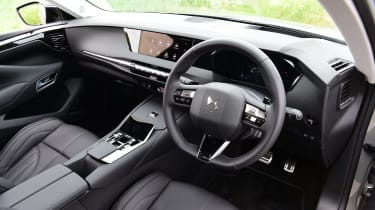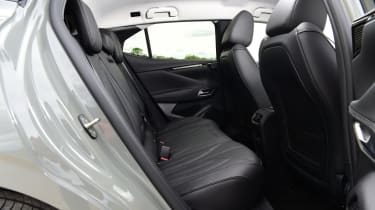DS 4 E-TENSE review
The DS 4 E-Tense is an unusual take on the premium hatchback formula, but certainly isn’t without merit
Pros
- Comfortable
- Strong kit list
- Luxurious cabin
Cons
- Light, numb steering
- Rear seat-practicality
- No electric version until 2024
| Car type | Electric range | Fuel economy | CO2 emissions |
|---|---|---|---|
| Plug-in hybrid | 39 miles | 183-232mpg | 35g/km |
The DS 4 hatchback is a plug-in hybrid model from DS, Stellantis’ Citroen spin-off luxury brand. DS has been with us for a few years now as an upmarket rival to the likes of Audi, BMW, Mercedes, Lexus and Jaguar, but progress has been steady rather than spectacular so far – the DS 4 is a model intended to accelerate the brand’s sales growth considerably, however, and will also eventually be available in fully-electric guise.
It slots into the range above the compact DS 3 and bulkier DS 7, pitching it squarely against company-car favourites like the BMW 1 Series, Audi A3 and Mercedes A-Class – a daunting line-up of rivals by any measure. So does it have what it takes to go toe-to-toe with those household names?
Under the interestingly styled metal, there’s a lot that’s familiar about the DS 4. Its ‘E-TENSE 225’ petrol-electric drivetrain is also used in the Peugeot 308 and Vauxhall Astra plug-in hybrids, pairing a 1.6-litre turbocharged petrol engine with an electric motor for a combined power output of 222bhp. A mild update in 2022 increased official electric range to 39 miles. Electric range originally stood at 35 miles in official tests, although during our time with the car we managed around 28 to 30 miles in mixed driving; ramping up the regenerative braking helps preserve the battery’s charge, especially in town.
Those figures translate to a Benefit-in-Kind (BiK) tax rating of 12% right through to 2025; favourable versus a petrol car, but some way shy of the Mercedes A 250 e (8%) – or indeed all pure-electric models, which sit in the 2% bracket for the foreseeable future. Charging is relatively straightforward; a 7kW home wallbox will top up the 12.4kWh battery in just two hours, while a three-pin plug performs the same task in around seven hours.
Inside, the designers have toned down some of the chintzy trim and diamond patterns seen in the DS 7 and the DS 9 luxury saloon. But the design looks and feels disjointed in parts, with some odd ergonomic aspects, such as the window switches being placed high up on the narrow door top, and a mix of physical and touch-sensitive controls. There’s a mishmash of lines, textures, and materials, too, but at least it’s all pretty high quality.
Every model gets a 10-inch touchscreen and a seven-inch digital driver’s display, with the former featuring new graphics and customisable shortcut buttons. It’s more responsive than previous DS setups, and on higher-spec models works in conjunction with a touchpad on the centre console, which can be used to access regular functions such as navigation, or your favourite radio station. But while the graphics are bright and clear, navigating some menus and selecting some functions is confusing.
Starting with a full battery means the car runs on electric power by default. However, to get the best from the DS 4 you’ll need to shuffle the drive mode to Comfort, which makes maximum use of the standard (on the plug-in hybrid) Active Scan Suspension. This uses a camera on the windscreen to survey the road for potholes or imperfections, prepping each wheel in advance to cushion the ride. It works well, making the DS 4 easily one of the most comfortable cars in this class.
The tradeoff is a fairly inert driving experience. The steering is light in all driving modes and lacks any feel or feedback. Body control is fine, but the DS 4 can’t match a BMW 1 Series or even an Audi A3 for driving fun. The gearbox shifts pretty sweetly, though, and the hybrid powertrain is hushed until you really floor the accelerator.
Doing so reveals adequate but not spellbinding performance. The 0-62mph sprint is taken care of in 7.7 seconds, but the electric motor does a good job of successfully covering any flat patches left by the turbocharged engine, meaning more often than not the car feels quicker than the numbers suggest. The regenerative brakes aren’t particularly strong, but they work effectively, putting charge back into the battery that might otherwise be lost.
When it comes to practicality, boot space is largely on par with rivals – bigger than an Audi A3 TFSI e or a SEAT Leon e-Hybrid, in fact. However, at 390 litres the E-TENSE’s load area is 40 litres smaller than the purely petrol model’s – and there’s no underfloor storage for keeping the charging cables while they’re not in use. Space in the rear seats is compromised, too; both head and legroom are tight for taller adults.
DS is keen to emphasise its “high-end customer experience” – running from the time you order the car, through the sales process and after it has been delivered – in order to justify its cars’ fairly strong pricing. The DS 4 E-TENSE starts at just over £40,000 in Trocadero trim, rising to around £44,000 for the Rivoli, or over £47,000 for the flagship Opera model.
The Trocadero model gets what DS calls ‘Tungsten Diamond cloth’ inside, while the Rivoli model (the spec we tested) features black leather trim and matrix LED lights. DS introduced a new range-topper called the Opera in October 2022, which features brown heated, cooled and massaging Nappa leather seats. It also gets a panoramic sunroof, wireless smartphone charging, an electric tailgate and heated steering wheel.
Overall, the DS 4 E-TENSE is an appealing car – and certainly the most convincing offering from the French premium brand to date. But a lack of driver appeal compared to a BMW, potentially divisive interior styling and some practicality compromises could hold it back from being the out-and-out success DS needs it to be.


